- Faculty News
- Student News
- Lab News
- Publications
- Meetings and Presentations
- Outreach
- Grants
- Announcements
- About This Newsletter
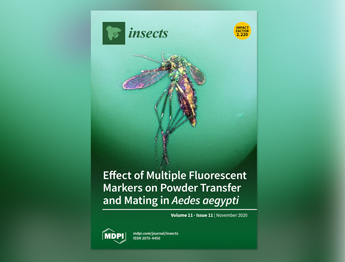
ABOVE: Diana Rojas had a paper recently published and selected as the cover for the journal Insects.
From the Department Chair
While it is difficult to put into words the disruptions and complexities of dealing with the coronavirus, I also think it is important to put into perspective how much our department has accomplished despite the global pandemic. While some might look at the year as being lost, I believe the department has shown great resilience and continues to serve its stakeholders and students and produce impactful research that is improving the lives of our citizens and increasing our understanding of the complex world we live in.
Our department continues to grow with the addition of new faculty both here in Gainesville and at RECs. Dr. Eric Caragata, Dr. Yoosook Lee and Dr. Brian Giordano joined our faculty at FMEL. Dr. Tololupe Morawo joined our faculty at the IRREC in Fort Pierce as our new insect biocontrol expert, and Dr. Alexandra Revynthi joined the horticultural entomology program at TREC in Homestead. Here in Gainesville, Dr. Phil Hahn (insect ecology) and Dr. Estelle Martin (vector biology) joined our department and Dr. Ted Burgess (veterinary entomology) will be joining us in January. For our new faculty, there has been the added challenge of getting to know people in the midst of lockdown, social distancing and trying to get to know faces that are constantly covered by masks. I know that these new faculty have experienced unprecedented challenges, but also recognize that we continue to hire outstanding people and scientists who have worked to overcome these challenges.
We have seen additional changes in the past year as we celebrate the careers and accomplishments of faculty and staff who have retired. Dr. Catherine Mannion, Dr. Phil Koehler, Dr. Jim Cuda, Dr. Joe Funderburk, Dr. Robin Giblin-Davis and Mr. Nik Hostettler have either retired or will do so at year’s end. We congratulate them on their many years of service and wish them well in their transitions to the next phase of their lives. As has been my experience with many retired faculty members from our department, I am sure that these folks will continue their involvement, and we will get to see them often.
In spite of the pandemic, we have not been idle in the last year. Most of our courses have been offered either on-line or in a hybrid manner to provide students the best possible educational experience under these unusual circumstances. I am grateful for all the investment in distance learning that has taken place over the last two decades and was part of the vision of my predecessor, John Capinera. Because of John’s vision, I am certain that we were better prepared than most in making this conversion. We have also learned to accommodate Extension delivery and outreach programs through online mechanisms or in person meetings at reduced capacity. We have adopted the rules of social distancing, mask wearing, and working to minimize occupancy in our labs. To my knowledge, we have not had a single work-related instance of transmission here in Gainesville, and I am extremely grateful to our faculty, students, postdocs and staff who have made compromises in both their personal and professional lives to keep us moving forward.
The last year has also seen a renewed and committed response to social injustice that has been a big part of our news cycle. I believe that our department under the leadership of Dr. Heather McAuslane and the newly established Diversity, Equity and Inclusion Committee, has made significant strides in developing a framework and strategic plan for addressing these issues for our department. These conversations have not been easy, but they are necessary to our future, and I look forward to implementing recommendations for a more inclusive and welcoming Department and University in the coming year.
Although the pandemic is far from over, I am optimistic and enthusiastic about the coming year. I believe that some of the strategic planning on issues such as invasion sciences, urban pest management and pollinator biology and conservation will bring opportunities for growth, partnership and investment in 2021. We have had a very good year in terms of competitive grant funding, and I am hopeful that we have positioned ourselves for another very successful year around some of these initiatives. Our educational and Extension programs continue to thrive and our efforts to coordinate and advertise our programs seem to be paying off. There will be opportunities to leverage our efforts and successes to develop integrated programs and I am confident that we can be successful. I know that we will have another challenging start to 2021 and as frustrating and difficult as 2020 has been, I believe we are positioned for success.
Winter/semester break has been a part of my entire adult life and a time to be with my family and friends, to rest and renew and to prepare for coming year. This year will be different in many ways, but I hope that we can all find time to reflect on the good fortune that allows us to be part of an academic department, College, and University that recognizes our contributions, that embraces creativity and values our diversity. I will be the first in line to get my vaccination in 2021 and am willing to wait a few more months to see my family and friends. We saved a lot of resources in 2020 since we did not have an alumni reception at the ESA meeting. I am looking forward to a “mask-burning” celebration at the beginning of Fall semester to celebrate all that we’ve accomplished in a time of unprecedented challenge using the money that we saved! I wish you all a safe and relaxing holiday season.
-Dr. Blair Siegfried, Professor and Department Chair

Dr. Bryony Bonning was the 2020 recipient of the ESA PBT Recognition Award in Insect Physiology, Biochemistry and Toxicology. The award was announced at the PBT section networking session during the ESA meeting, during which she presented on “Targeting Hemipterans with Bacillus thuringiensis-derived Pesticidal Proteins”.

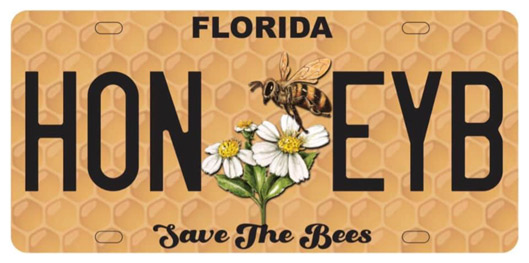
ABOVE: Specialty license plate developed by the Florida State Bee Keepers Association! Proceeds from the sales of the plate will be used for Honey Bee research. You can pre-order the plate now here.
Congratulations Fall 2020 Graduates!
Earning a PhD degree are:
Ana Paula dos Santos de Carvalho
Tony Hughes
Sang-Bin Lee
Jayshree Patel
David Plotkin and
Homan Regmi.
Graduating from our MS program are:
Rosan Adhikari
Elizabeth Braatz
Casey Federovitch
Alessandra Humphries
Cleveland Ivey
Chealsey Lynch
Kimberly Kester Post
Jean Solon Rosulme
Eddie Shuker
Noemi Soto and
James Weaver.
Graduating with a BS degree are:
Cody Curd
Anna Dell
Janna Josafat
Kaylin Kleckner
Genhsy Monzon and
Edward Raykhelson.

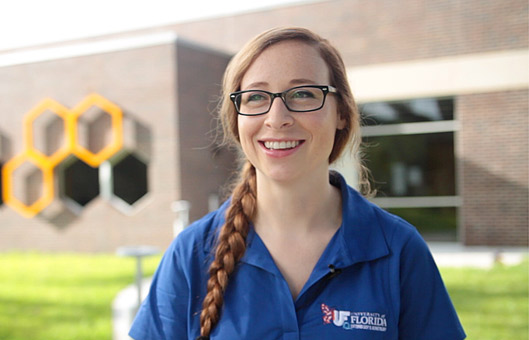
ABOVE: Laurel Lietzenmayer, Ph.D. student in the Taylor Lab, is the 2020 recipient of the UF/IFAS Gahan Entomology & Nematology Graduate Student Teaching Award. As part of this award, Laurel will receive a $1000 scholarship from the Gahan Scholarship Fund. Laurel exemplifies our commitment to teaching excellence in this department, and we are so thankful for her efforts. The UF/IFAS Gahan Entomology & Nematology Graduate Student Teaching Award is awarded annually and our graduate students can apply in the Spring, Summer, or Fall semester. Announcement of the award guidelines and deadline are sent at the beginning of each semester. Congratulations Laurel!

Congratulations to all our students who participated in ESA’s Virtual Annual Meeting from November 11th to the 25th. Read our highlights below.
Kelly Carruthers, a PhD student in Dr. Carey Minteer’s lab, received second place in the Entomological Society of America’s (ESA) Graduate Speaking Competition at the 2020 Entomological Society of America’s Annual Meeting. Her talk was titled, Impact of Biological Control Agent, Pseudophilothrips ichini, on Brazilian peppertree.

Jayshree Patel obtained second place in the ESA2020 student Poster MUVE, Urban, Veterinary and Forensic Entomology section with her poster titled, Inferring termite colony size using wood consumption in subterranean termites (Blattodea: Rhinotermitidae) in laboratory-rearing conditions).

Sang-Bin Lee obtained first place in the Korean Young Entomologist oral presentation organized during ESA2020, for his presentation titled, Task allocation and behavioral flexibility in subterranean termites.
Sang-Bin Lee was awarded the Entomological Society of Anerica Shripat Kamble Urban Entomology Graduate Award for Innovative Research.

Johnalyn Gordon obtained first place in the ESA2020 10-minute student competition MUVE, Urban, stored product pests with her presentation titled, Subterranean termite colony elimination can be achieved even when only a small fraction of foragers feed upon a CSI bait.

The Lucky Lab was busy at ESA2020! Lots of talks, symposia, awards, and Entomology Games this year.
Leo Ohyama placed 1st in the Grad SysEB, Climate Change and Biogeography section with his talk, The species-area relationship in ant ecology.
Rachel Atchison placed 2nd in the Grad PIE, Ecology section with her talk titled, Seed-removing ant (Hymenoptera: Formicidae) species in longleaf sandhill are resilient to frequent fire.
VR Seagal placed 2nd in the Grad SysEB, Climate Change and Biogeography section with her talk titled, Modeling the potential distribution of the invasive little fire ant, Wasmannia auropunctata, in the southeastern US.
Jacob Hornfeldt placed 2nd in the Undergrad SysEB section with his talk titled, The little fire ant: Using behavioral experimentation to understand invasive ant social structure.
Jason Williams helped secure the UF Entomology Games team a 4th place victory this year!
Need to name that bug? A host of experts are available to help Floridians identify any insect or related arthropod. If a mystery creature has six or more legs, the UF Insect ID Lab is the place to call.
In 2012 a new spittlebug began to be found on oaks in Florida. At the time it was an undescribed species, and it just recently received the name of Clastoptera querci. Both the adults and nymphs are found on oaks. They are rather small, with the adults being 3-4 mm long. It likely is an introduced species, although its origins aren’t known.
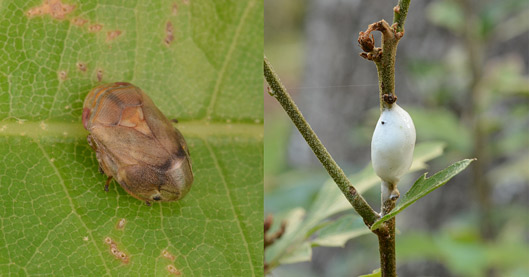
ABOVE:
Left to right, Clastoptera querci adult and Clastoptera querci encased in foamy bubbles on an oak tree.
If you need insect images for a publication or presentation for your UF/IFAS Extension or teaching work, you can go to this direct link, pictures are copyrighted material and intended for official UF use only. Log onto the website using your Gatorlink credentials.
Lyle Buss is the UF/IFAS Insect ID Lab manager.

Think it might be a nematode problem? The Nematode Assay Laboratory serves Florida and other states by providing nematode assays and expert advice regarding nematode management.
For more information on the Nematode Assay Laboratory, please contact the lab manager Dr. Billy Crow.
Alomar AA, and Alto BW. 2020. Mosquito responses to lethal and nonlethal effects of predation and an insect growth regulator. Ecosphere In Press.
Alomar AA, Eastmond BH, and Alto BW. 2020. The effects of exposure to pyriproxyfen and predation on Zika virus infection and transmission in Aedes aegypti. PLOS Neglected Tropical Diseases 14(11), p.e0008846. https://doi.org/10.1371/journal.pntd.0008846
Flávio RMG, Ovruski SM, Suárez L, Cancino L, and Liburd OE. 2020. Biological control of tephritid fruit flies in the Americas and Hawaii: A review of the use of parasitoids and predators. Insects 11: 662. https://doi.org/10.3390/insects11100662
Florio J, Verύ LM, Dao A, Yaro AS, Diallo M, Sanogo ZL, Samaké D, Huestis DL, Yossi O, Talamas E, Chamorro ML, Frank JH, Biondi M, Morkel C, Bartlett C, Linton ML, Strobach E, Chapman JW, Reynolds DR, Faiman R, Krajacich BJ, Smith CS, and Lehmann T. 2020. Diversity, dynamics, direction, and magnitude of high-altitude migrating insects in the Sahel. Scientific Reports 10: 20523. https://doi.org/10.1038/s41598-020-77196-7
Jasso‐Selles DE, De Martini F, Velenovsky IV JF, Mee ED, Montoya SJ, Hileman JT, Garcia MD, Su, NY, Chouvenc T, and Gile GH. 2020. The complete protist symbiont communities of Coptotermes formosanus and Coptotermes gestroi: morphological and molecular characterization of five new species. Journal of Eukaryotic Microbiology 67:626-641. https://doi.org/10.1111/jeu.12815
Lake EC, David AS, Spencer TM, Wilhelm Jr VL, Barnett TW, Abdel-Kader AA, Carmona Cortes A, Acuna A, Mattison ED, and Minteer CR. 2020. First drone releases of the biological control agent Neomusotima conspurcatalis on Old World climbing fern. Biocontrol Science and Technology pp. 1-10.
Martini X, Hughes MA, Conover D, and Smith J. 2020. Use of semiochemicals for the management of the redbay ambrosia beetle. Insects 11:796.
Martini X, Hoyte A, Mafra-Neto A, Aksenov AA, Davis CE, and Stelinski LL. 2020. Progress toward an attract-and-kill device for Asian citrus psyllid (Hemiptera: Liviidae) using volatile signatures of citrus infected with huanglongbing as the attractant. Journal of Insect Science 20:25.
Minteer CR, Smith MC, Madeira P, Goosem C, Zonneveld R, Makinson J, Wheeler GS, and Purcell M, 2020. Is biological control for earleaf acacia (Acacia auriculiformis) Feasible in the United States?. Biocontrol Science and Technology pp. 1-25.
Mizumoto N, Rizo A, Pratt SC, and Chouvenc T. 2020. Termite males enhance mating encounters by changing speed according to density. Journal of Animal Ecology 89:2542-2552. https://doi.org/10.1111/1365-2656.13320
Prade, P, Minteer CR, Gezan SA, Arguijo VC, Bowers K, Cuda JP, and Overholt WA. 2020. Host specificity and non-target longevity of Calophya lutea and Calophya terebinthifolii, two potential biological control agents of Brazilian peppertree in Florida, USA. BioControl pp. 1-14.
Reeves LE, Medina J, Miqueli E, Sloyer KE, Petrie W, Vasquez C, and Burkett-Cadena ND. 2020. Establishment of Aedes (Ochlerotatus) scapularis (Diptera: Culicidae) in mainland Florida, with notes on the Ochlerotatus Group in the United States. Journal of Medical Entomology tjaa250. https://doi.org/10.1093/jme/tjaa250
Rojas-Araya D, Alto BW, Cummings DAT, and Burkett-Cadena ND. 2020. Differentiation of multiple fluorescent powders, powder transfer, and effect on mating in Aedes aegypti (Diptera: Culicidae). Insects 11:727.
Sourakov A. 2020. Emperors, admirals and giants, zebras, tigers and woolly bears: casting a broader net in exploring heparin effects on Lepidoptera wing patterns. F1000Research 7:1842.
https://f1000research.com/articles/7-1842/v3
Talton HR, Rhodes EM, Chase CA, Swisher ME, Renkema JM, and Liburd OE. 2020. Effect of cultural practices on Neopamera bilobata in relation to fruit injury and marketable yields in organic strawberries. Insects 11:843. https://doi.org/10.3390/insects11120843

New on Featured Creatures:
A Bombardier beetle, Pheropsophus aequinoctialis: Written by Gregory Parrow and Dr. Adam Dale.
Do you have a favorite creature? Learn how to make it into a Featured Creatures!
Dr. Ginny Greenway, a post doctoral researcher in the Miller Lab, attended the Association for the Study of Animal Behaviour (ASAB) Virtual Winter conference and presented a poster titled, How does the timing of weapon loss influence reproductive traits in the insectNarnia femorata? This poster, won the Most engaging prize at the conference and showcased the results of a collaborative study with undergrad researcher Emily Angelis. Emily's work in the Miller Lab was funded via the UF Center for Undergraduate Research's Undergraduate Scholars Program.


Kristin Dunn, a Ph.D. Candidate in the Branham Lab, co-organized and moderated the symposium “Insects and Micro-CT: Recent Advances in the Use of 3-Dimensional Data within Entomology” at the ESA Annual Meeting on November 18th. Dunn also gave a presentation in the symposium titled, Comparing tracheal morphology in the light organs of fireflies (Coleoptera: Lampyridae) to reveal new insights into their evolution.
Erick J. Rodriguez, doctoral student in the Branham lab, co-organized and hosted an online meeting of the Anastrepha fraterculus Workers Group. This meeting provided an opportunity for members of the Tephritid Workers of The Western Hemisphere to share and discuss current research on this South American fruit fly species group.

Jason Williams’ work was presented in a talk titled, The chronicles of Nylanderia: Globetrotter phylogenomics and integrative species delimitation, which was part of a member symposium: Global Advances in Ant Phylogenomics.
Former Lucky Lab post doctoral researcher, Dr. Miles Zhang, presented a talk titled, UCE data reveal multiple origins of rose gallers in North America: Global phylogeny of Diplolepis (Hymenoptera: Cynipidae).
Dr. Andrea Lucky organized a SysEB section symposium titled, Myrmecology For All: Combining Morphology, Molecules, Ecology, and Behavior to Advance Ant Systematics. During this symposium she also presented a talk titled, Myrmecology, gender, and geography: changing demographics of a research community over thirty years.

Dr. Carey Minteer was invited to present a talk titled, Biological Control of Brazilian Peppertree, at the 2020 Aquatic Weed Control Short Course held October 28-30.
Kristen Bowers, a Ph.D. student in the Minteer lab, was invited to presentation a talk titled, Biological Control: The Basics, at the 2020 Aquatic Weed Control Short Course held October 28-30.
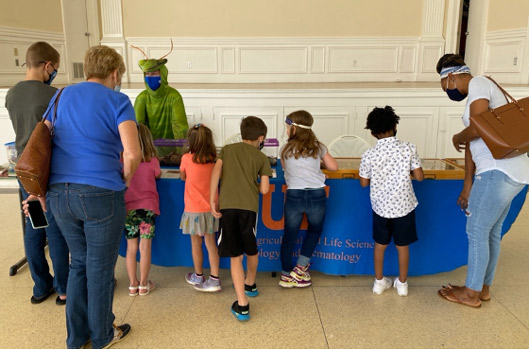
ABOVE: Brynn Johnson educating the Jacksonville Garden Club on the importance of “bugs” on November 14th. Photo by J.Standley
Recent Outreach events:
November 14th – Virtual Bug Fest, hosted by the Undergraduate Entomology Club. There was a live bee demo, origami, pinning techniques, insect care, and more.
November 14th – Jacksonville Garden Club in person presentation on the importance of “bugs” to children with the animated volunteer Brynn Johnson who also dressed as a mantis.
November 21st – Girl Scouts of West FL virtual presentation on meeting an entomologist.
Upcoming Outreach events:
December 17 - Alachua County Schools. Melody Bloch volunteered with a virtual presentation to fourth graders.

What’s better than a live show and tell of some really cool arthropods?! Our live petting zoo consists of: tarantulas, scorpions, vinegaroons, bess beetles, Madagascar hissing cockroaches, and native insects when in season. With a short training program, they are available for you to check out should you be leading an outreach event, even if it is virtual. The critters are always popular with both youth and adults and are used as a tool to expose the public to STEM disciplines. We have doubles of our most popular critters, as well as various native insect species depending on the time of year. We have large wood and Plexiglas cages for viewing our native orb weaving spiders. There is one travel cage and one larger static cage. We also have activity kits and lesson plans that are available as well. Please be sure to contact us and review the protocol on transportation and handling of the animals. If you lead an outreach event, be sure to fill out a documentation form so your event can be included in the newsletter and we can log all outreach events. Also note, that volunteering to assist with outreach events will count as departmental service for ENSO travel grants. (Please note that some venues require background checks or additional screening.)
If you have any questions or would like to volunteer, please email us.
Cheers – Jennifer Standley, Outreach Coordinator.
Getting social!
Use #UFBugs so our department can find and share your social posts easily!
Departmental Holiday Food Drive – December 1st to the 15th.
Holiday Sweet Treat Tasting – Tuesday, December 15th from 10 a.m. to 2 p.m.
Departmental Virtual Graduation - Friday, December 18th from 12 p.m. to 1 p.m.
Want to stay up to date? Check out our website home page for a link to our Google calendar.
Suzy Rodriguez is the newsletter editor and does the HTML coding. Newsletters usually are published around mid-month. Submit items for an issue by the seventh of the month.
We like to share news when it happens using our social media outlets: Twitter, Facebook and YouTube. Follow us on these sites for daily updates! When you send news, we will post it on one or more of these sites and again in the monthly newsletter. Please be sure you have permission from people in photographs you submit for publication.
UF-Bugnews-L listserv subscribers receive notices when issues are posted. Our home page has instructions for subscribing and unsubscribing.
Special thanks to James Brown and Nancy Sanders for reviewing the newsletter for errors, and to Jane Medley and Don Wasik for webpage build and design.
Give Back
Want to support the UF Entomology & Nematology Department? Consider making an online gift today! Questions can be directed to Cody Helmer at (352) 392-1975 or chelmer@ufl.edu.